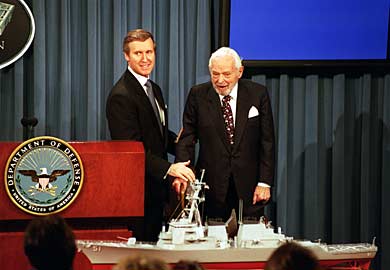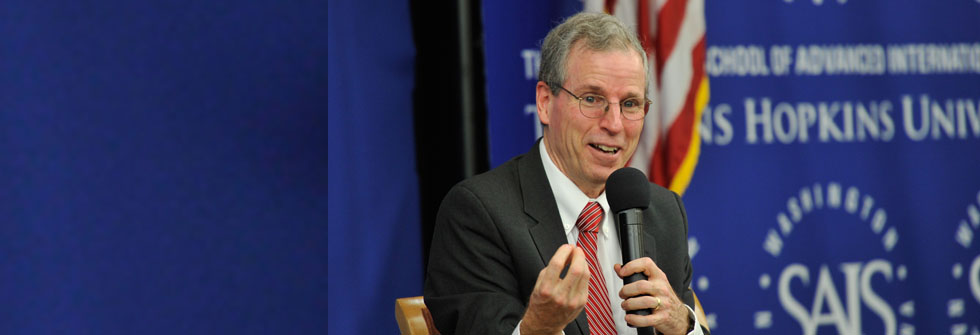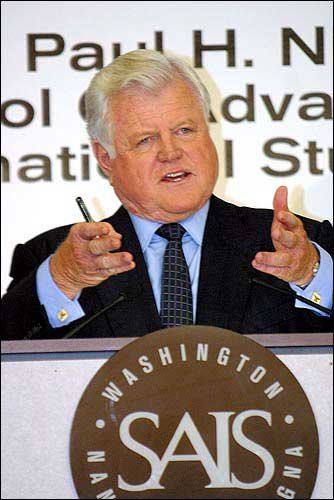Is the James Rickards banner that flies the flagstaff of the USS Libertarian a symbol of acceptance by a principled and informed crew, or fluttering limply as a warning to the world that libertarianism and its flagship are safely in the grip of the Conspiracy? ... James Rickards, a Covert Double-Agent of Betrayal for the CFR?
| James G. Rickards |
Wikipedia
Education: Paul H. Nitze School of Advanced International Studies, University of Pennsylvania Law School
Foundations of War - Is the CFR Financing SAIS Nitze's "Not-See" Spy School?
In 1944 a group of statesmen founded The Paul H. Nitze School. of Advanced International Studies (SAIS). At least one, Paul H. Nitze, was a Council on Foreign Relations(CFR) member. The resident SAIS faculty includes 36 professors. At least 20 are CFR members, two are CFR fellows.
Council on Foreign Relations members in an ad hoc committee called the "Special Group" and through a vast intragovernmental undercover infrastructure called the "Secret Team" plan and coordinate massive psychological operations scripted using "Tactics of Deception." American citizens and citizens of foreign nations are manipulated to accept the particular climate of opinion the groups are seeking to achieve in the world. Is SAIS a cover for Council on Foreign Relations "Special Group" and "Secret Team" members and covert operator training school?1

CFR Member Nitze's vita reads:
1953-61 President Foreign Service Educational Foundation, Washington D.C.
1947-53 Various positions with the Department of State,
1947 Deputy Director of the Office of International Trade Policy.
1948 Deputy Assistant Secretary of State for Economic Affairs.
1949 Deputy Director of the State Department's Policy Planning Staff,
1950 Director State Department's Policy Planning Staff
1961-63 Assistant Secretary of Defense for International Security Affairs.
1963-67 57th Secretary of the Navy
1967-69 Deputy Secretary of Defense.
1969-74 US Delegation to the Strategic Arms Limitation Talks with the Soviet Union.
1981-84 Headed Arms Control Talk Negotiating Team
1984-89 Special Advisor Arms Control to Sec. of State and President.
President Reagan appointed him Ambassador-at-Large, the position in which he served until his retirement. Nitze has been diplomat-in-residence at SAIS since retiring from the State Department on April 30, 1989.3
When a CFR member tries to make a difference it is a difference designed to create tension between two or more target groups. In 1993 Nitze published a book titled TENSION BETWEEN OPPOSITES: REFLECTIONS ON THE PRACTICES AND THEORY OF POLITICS. Is Nitze really retired, or has he assumed another cover for his role in the "Special Group" that co-ordinates State Department Psychological Operations focused at Americans and citizens of other nations?4
CFR member Zbigniew Brzezinski is SAIS Robert E. Osgood Professor of American Foreign Policy. CFR members: Brzezinski (Public Law and Government Professor, Columbia ); Frederick C. Barghoorn (Political Science Professor, Yale ); and George A. Kelly (Politics Professor, Brandeis ); contributed to THE ART AND SCIENCE OF PSYCHOLOGICAL OPERATIONS. The book contains a series of case studies sponsored by the US Department of the Army.
CFR member Paul Wolfowitz, Ph.D. is SAIS Chairman and Dean. Prior to joining SAIS as dean in 1994, Wolfowitz taught at the National Defense University as a visiting distinguished fellow.5
Other Council on Foreign Relations SAIS faculty members are: Fouad Ajami (Majid Khadduri Professor and Director of Middle East Studies), A. Doak Barnett (Professor emeritus of Chinese Studies), Frederick Brown (Fellow, Foreign Policy Institute and Adjunct Professor Southeast Asian Studies Program), Charles Doran (Andrew W. Mellon Professor of International Relations and Director of Canadian Studies), Isaiah Frank (William L. Clayton Professor of International Economics), Francis Fukuyama (Director of the SAIS Telecommunications Project and Fellow, Foreign Policy Institute), Charles Gati (Fellow, Foreign Policy Institute), Christian Herter (Professorial Lecturer in International Relations), David M. Lampton, Ph.D.(George and Sadie Hyman Professor of China Studies and Director of China Studies), Michael Mandelbaum (Christian A. Herter Professor and Director of American Foreign Policy), Steven Muller (Fellow, Foreign Policy Institute), Donald Oberdorfer (Journalist-in-Residence, Foreign Policy Institute), George Packard (Edwin O. Reischauer Professor and Director of the Reischauer Center for East Asian Studies), Riordan Roett (The Sarita and Don Johnston Professor and Director of Latin American Studies), Hederick Smith (Editor-in-Residence, Foreign Policy Institute), S. Frederick Starr (Chairman, Central Asia Institute), I. William Zartman (Jacob Blaustein Professor of International Organizations and Conflict Resolution and Director of African Studies). The two Council on Foreign Relations Fellows on the SAIS faculty are Andrew J. Bacevich and Wilford L. Kohl.
When SAIS opened 15 students were enrolled. SAIS became a division of Johns Hopkins University in 1950. By 1963, SAIS outgrew its first quarters on Florida Avenue, Washington, DC, and moved to one of its two present buildings on Massachusetts Avenue. By 1995, more than 8,600 men and women had graduated from SAIS. They are now working in 143 countries. Are these graduates covert operators?
SAIS Alumni are employed by the U.S. Departments of Agriculture, Commerce, Education, and State, and Office of the U.S. Trade Representative [see NAFTA PSYOP].6 President William J. Clinton, Secretary of State Madeleine K. Albright, Secretary of Defense William S. Cohen, Secretary of Health Education and Welfare Donna E. Shalala and Director of the CIA John Deutch are all Council on Foreign Relations members.
SAIS maintains centers in Bologna, Italy, and Nanjing, China. The Bologna center was founded in 1955. "The student body is composed of some 150 to 170 university graduates. About 45 percent of the students come from the United States, 45 percent from Europe, and the remaining 10 percent from Canada and countries in Asia, Africa and Latin America. The Bologna Center presently has 4,221 alumni representing 88 nationalities. They hold positions of importance in the public and private sectors of their respective countries--in foreign ministries and other government agencies, international and regional organizations, multinational corporations, banks and other financial institutions, non-profit organizations, journalism, and research centers and universities around the world."7
Is SAIS a school for Intelligence Agents and Covert Operators? Do SAIS graduates work for American and foreign intelligence agencies? Are alumni of the Hopkins Bologna Center and Hopkins-Nanjing Center Foreign intelligence agents? Do these intelligence agents participate in psycho-political operations and covert operations that further the aims of the United States Council on Foreign Relations and its branch organizations in other nations?
Continue reading @source
Pictoral Illumination of Treachery

- On January 10, 2001, Paul H. Nitze examined the model of the helicopter carrier and missile launcher destroyer presented by Secretary of Defense William S. Cohen. The ship, which was launched in 2004, was called USS Nitze to honor the theorist of the Cold War, who was 94 years old by then.
The NETWORK SOCIETY (pdf - 460 pgs)
Center for Transatlantic Relations
The Paul H. Nitze School of Advanced International Studies
The Johns Hopkins University

Tim Geithner Delivers Remarks At SAIS
Commencement Ceremony, 2012
 |
| U.S. Secretary of State Hillary Clinton speaks at the Johns Hopkins University Paul H. Nitze School of Advanced International Studies, on August 16, 2010 in Washington, DC. Clinton spoke about the global health initiative and American leadership in health around the world JHU SAIS to Host Washington, D.C., Launch of Hank Paulson’s New Book on Global Financial Crisis Senate Armed Services Committee Chairman Sen. Edward M. Kennedy, D-Mass., addresses the Johns Hopkins Paul H. Nitze School of Advanced International Studies in Washington. Kennedy said the Bush administration had failed to make a persuasive case for going to war against Iraq |



